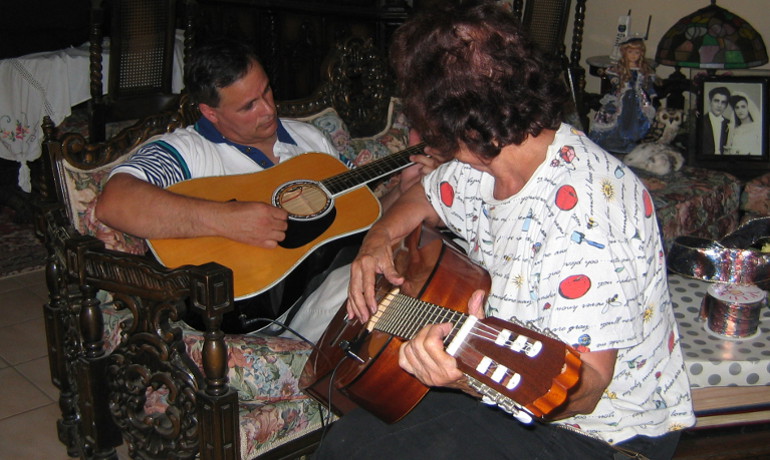MUSIC PROJECT
If you would like further information about how researchers have used music in teaching foreign languages, check out a literature review that I wrote in 2005: "The Use of Music for Learning Languages."
When teachers use music to enable students to get the most out of their language learning activities, they can break through barriers that separate the traditional subjects and make something more emotionally compelling and intellectually intriguing. (It's perfectly acceptable to sing folk songs in a language class one day, and the next day do vocabulary drills and vocalization practice.) Online music helps with this, encouraging student singing and speaking, and offering a deeper interaction with the culture.
Although students and teachers can already search the internet for songs that have target vocabulary, there is no program that puts target foreign language phrases into existing, familiar songs. Perhaps this could be a suggestion for a future "Google Gears" application. In this situation, students would input 30 or so target phrases, and the application would then find a song that would accomodate the meter and intonation of the greatest number of those phrases, compose a song sheet with lyrics, mark intonation, and sing the song while highlighting the text word by word. An easier request would be to simply insert target foreign words into familiar native songs, when the number of syllables and accent correlated properly. In this manner, the student would hear the new word while he remembers the old word. The results of a computer-generated dual-language song composition would probably be hilarious, an obvious creation of random association, but memorable, nonetheless. It could even double as a party game.
Because no program of this type exists, musical students of language can use word-replacement and phrasal substitution in a piecemeal fashion, as learning strategies. The National Institute of Environmental Health Sciences Kids Page is a very useful resource for the English learner to learn vocabulary, phrases, and grammar. It's a great site for anyone who wants to learn English. The music is presented in real time with the words, karaoke-style. I must also mention Youtube, which has taken karaoke singing to the masses. However, on the NIEHS page, songs have links to other educational content. For instance, with the song "The Rainbow Connection", there's a link about how rainbows form in the atmosphere.
Motivated students use learning strategies like these all the time, based on their drive to acchieve, self-efficacy values, and approaches to learning. For instance, analytic thinkers dissect phrases, while global thinkers use gestures. But teachers should push students to use new learning strategies as part of their overall preparedness and cultural competency. According to Rebecca Oxford, these learning strategies can be taught, improving student proficiency overall or in specific tasks. Comprehensive language learning strategies can also be used to teach other subjects, such as writing, history, or even math. That being said, strategies should be chosen carefully, according to task type. A teacher must address issues such as learner anxiety, motivation, and interest, so that the discussion takes into consideration student attitudes, beliefs, and stated needs.



